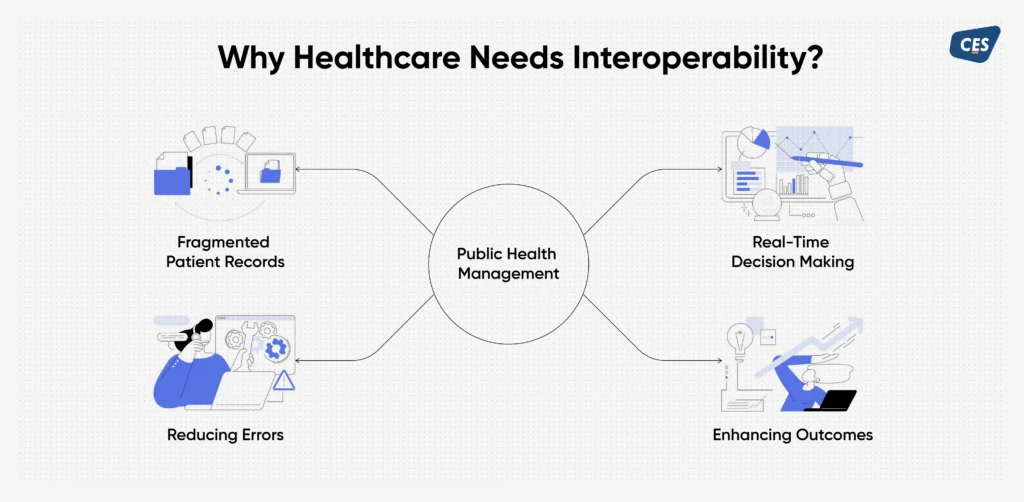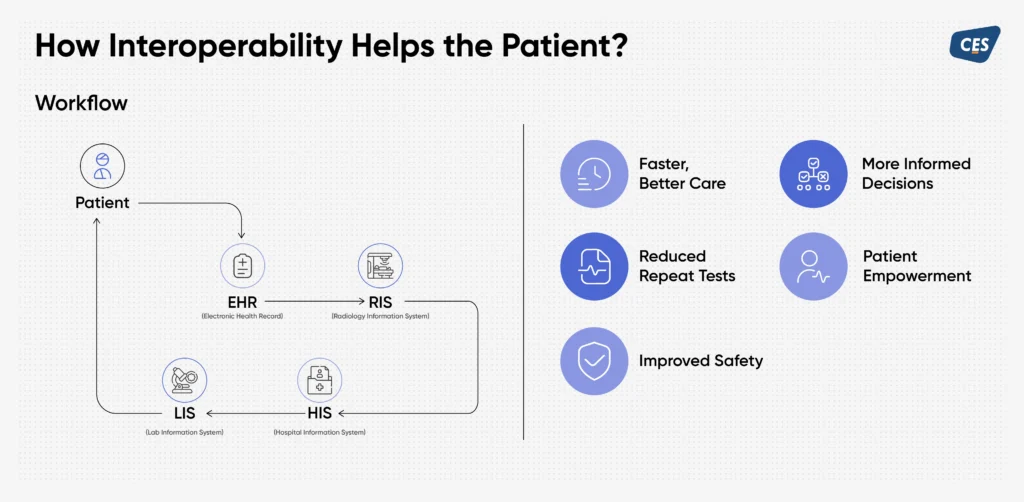Interoperability in Healthcare: Connecting Data, Enhancing Care
Interoperability in healthcare is no longer just a technical aspiration; it’s a critical necessity in today’s digitally connected world. It enables seamless data exchange across systems, improving care quality, patient safety, and operational efficiency. As patients receive care from multiple providers across hospitals, clinics, labs, and pharmacies often using different EHR systems. The need for unified access to medical records becomes essential. Without interoperability, data remains siloed, resulting in fragmented care, repeated tests, delays, and potential medical errors.
The COVID-19 pandemic underscored this challenge, as real-time data sharing became vital for coordination across public health agencies, testing labs, and hospitals. Today, with the rise of virtual care, remote monitoring, and data-driven decision-making, interoperability plays a central role in enhancing patient engagement, enabling personalized treatment, and reducing healthcare costs. By eliminating administrative burdens and improving care coordination, hospitals also benefit from better outcomes and operational gains. CES supports this healthcare transformation by delivering secure, standards-based interoperability solutions that connect systems and empower smarter, more connected care.

How Interoperability Helps Patients
- Enhanced Patient Safety: Interoperable systems give providers full access to a patient’s medical history, reducing errors and duplicate tests. This leads to safer, more accurate care.
- Empowered Patient Engagement: Patients can easily access their health records, enabling them to manage conditions and make informed decisions about their care.
- Personalized Treatment Through Unified Data: Seamless data sharing across providers ensures aligned treatment plans and prevents conflicting therapies.
- Affordable Care Through Smarter Systems: By cutting redundant tests and streamlining processes, interoperability lowers unnecessary healthcare expenses.

Benefits for Hospitals and Providers
- Increased Efficiency and Cost Savings: Interoperability reduces paperwork and streamlines workflows, boosting overall efficiency by up to 30%.
- Enhanced Care Coordination: Quick access to accurate patient data improves care, especially in emergencies, with up to 20% improvement in coordination metrics.
- Reduced Administrative Burden: Minimizing redundant tasks frees up time for healthcare providers, reducing administrative workload by up to 40%.
- Improved Data Analytics: Interoperable systems enable tracking outcomes and identifying areas for improvement, enhancing analytics accuracy by 15–20%.
- Support for Clinical and Regulatory Goals: Interoperability not only supports clinical excellence but also helps meet regulatory requirements and value-based care goals.
What Happens When Interoperability Is Lacking
Without interoperability, the healthcare system becomes fragmented. Vital information gets trapped in isolated systems, leading to communication gaps, delays in care, and avoidable medical errors. For patients, this can result in frustration, confusion, and even harm.
From an organizational standpoint, lack of interoperability can lead to increased costs, inefficiencies, and regulatory risks. It hampers innovation and makes it harder for systems to scale or adopt new technologies.
The Future of Healthcare Interoperability
The future of healthcare interoperability lies in integrating AI and data-driven health systems, blockchain-secured health records, global patient identifiers, personal health ecosystems, and predictive analytics to enable seamless, secure, and personalized care.
CES EHR Modernization
CES helped a US-based healthcare technology company modernize its EHR platform to improve patient management, scheduling, reporting, and claims processing. The client faced challenges like limited funding, poor interoperability, and outdated architecture. CES addressed these by building a cross-platform app for offline data entry, upgrading the web app with a modern UI and microservices, and integrating systems to enhance reporting. This led to improved performance, 1,000 man-hours saved annually, 30% lower cloud costs, and streamlined development through automated testing and DevOps.
Why Choose CES?
- Connects healthcare systems like EHRs, LIS, and RIS to enable real-time or near real-time data exchange.
- Implements HL7, FHIR, DICOM, and CDA standards to ensure consistent data formats and protocols.
- Creates middleware and APIs to integrate legacy systems with modern healthcare applications.
- Standardize and map clinical data from diverse sources for meaningful use across platforms.
- Ensures secure data exchange with encryption, HIPAA, and GDPR compliance frameworks.
- Offers expert guidance on achieving healthcare interoperability and optimizing workflows.
- Delivers scalable cloud-based platforms to support flexible, remote healthcare data access.
Discover how CES Healthcare is enabling smarter, connected care through breakthrough technologies and insights.
From advisory to implementation, we work alongside you to transform healthcare delivery and unlock new possibilities.
See us as a potential collaborator in your digital health journey-reach out to marketing@cesltd.com to start the conversation.
